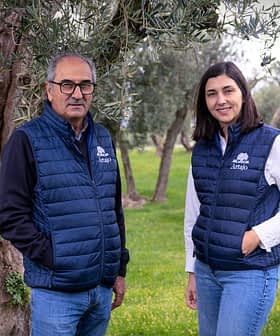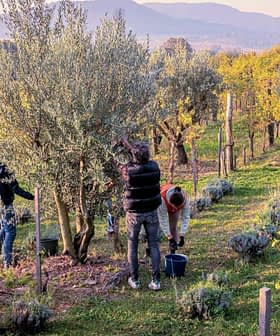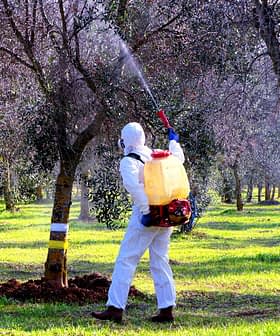Championing the Mediterranean Diet: EU Project Aims to Level the Playing Field with Processed Foods
The MedDiet4All project promotes the benefits of a Mediterranean diet and communicates the adverse health effects of ultra-processed foods.
 MedDiet4All team at the announcement of the new project in Mainz, Germany
MedDiet4All team at the announcement of the new project in Mainz, Germany The European Union-sponsored MedDiet4All project aims to promote the Mediterranean diet globally as a sustainable and environmentally friendly approach to food production and consumption. Through a survey and technology development, researchers hope to raise awareness about the benefits of the Mediterranean diet, counter the popularity of ultra-processed foods, and establish a transnational movement towards healthier eating habits.
Research sponsored by the European Union has yielded the first global survey aimed at understanding consumers’ perception of the Mediterranean diet worldwide.
The survey is part of a broader research effort to promote the Mediterranean diet as a healthier approach to producing and consuming food.
The E.U. project “MedDiet4All” cites the Mediterranean diet as the key to a sustainable agri-food industry and environmentally friendly agriculture.
See Also:Health NewsWith the survey, researchers intend to assess the obstacles to the widespread adoption of the Mediterranean diet by considering the price of foods included, their availability, eating habits and other social factors.
The new MedDiet4All survey is the first step in a three-year project, which received €2.4 million in E.U. funding via the PRIMA program. The 19-state alliance promotes food security, sustainable agriculture and a healthy lifestyle in the Mediterranean region.
“In this initial phase, we are gathering data from multiple sources through the survey and the wide network of associated institutions,” Achraf Ammar, who leads the project and is a researcher at the Department of Training and Movement Science at the Johannes Gutenberg-University Mainz in Germany, told Olive Oil Times.
Besides relying on researchers and agri-food companies from Germany, France, Luxembourg, Italy and Spain, the project also involves partners in Morocco, Algeria and Tunisia.
“Of course, we are now mostly focused on the survey’s answers coming from Mediterranean basin consumers in the PRIMA countries,” Ammar said. “As researchers, we are also very interested in analyzing the answers that will come from all over the world.”
The researchers behind MedDiet4All aim to establish a transnational movement to promote a widespread dietary shift associated with a healthier lifestyle.
To this end, MedDiet4All’s backers believe the advertising and marketing campaigns will spur the development of new technologies to improve food production and logistics in the Mediterranean area. A new mobile app will also help citizens on the path to a healthy lifestyle.
The project aims to counter the increasing consumption of ultra-processed foods and drinks by raising consumer awareness about the food they buy and eat.
“There is a growing body of studies showing how the significant consumption of ultra-processed foods and drinks might convey a detrimental impact on health,” Ammar said. “Some research shows that ultra-processed foods are making inroads because they tend to be cheaper than the unprocessed ones.”
“Ultra-processed foods and drinks are supported by large food retailers and facilities, so they are easily found everywhere, which is not always true for healthy food,” he added. “Additionally, consumers often choose ultra-processed foods and drinks because they are ready-to-eat, reducing the time needed to prepare a meal.”
Furthermore, Ammar said the colorful plastic packaging of ultra-processed foods and drinks often adds to the environmental burden they create.
Ultra-processed foods and drinks are mainly produced through energy-intensive manufacturing and marketed globally through heavy logistics.
“Their popularity is also linked to the aggressive marketing that most producers deploy,” Ammar said. “Those ads do not show the impact of the food on health. The consequence is that the population lacks awareness about this issue.”
Research conducted in 2021 by New York University’s School of Global Health showed how, across two decades, ultra-food popularity in the United States grew consistently.
In 2001, such foods accounted for 54 percent of the total calories and reached 57 percent in 2018. In the same period, whole food consumption dropped from 33 percent of total calories to 27 percent.
The latest research in Mediterranean countries, such as Italy and Spain, shows that energy intake from ultra-processed foods and drinks remains under 25 percent.
These trends also demonstrate that the popularity of the Mediterranean diet inversely affects ultra-processed food consumption. However, even in Mediterranean countries, research suggests there is a growing appetite for ready-to-eat, cheap, ultra-processed foods and drinks.
The project will focus on developing relevant technologies to improve the competitiveness and sustainability of healthy foods. The goal is to optimize logistics and reduce the overall costs of moving foods associated with the Mediterranean diet from the farm to the supermarket shelf.
“We are working on a MedDiet4All technology platform that could support the European Union’s Farm-to-Fork strategy,” Ammar said, indicating the need to develop a multi-center Mediterranean diet supply chain.
MedDiet4All partners are also working to improve the sustainability of food packaging with projects to develop environmentally friendly biofilms as an alternative to standard plastic films.
Another cornerstone of the work is to inform consumers about their efforts so they better understand how to follow the Mediterranean diet and what goes into maintaining a healthy and sustainable food system.
“A mobile app is in development intending to distribute a smart guide about the Mediterranean diet, the food and so forth,” Ammar said. “But it will also constitute a lifestyle coach for the consumer, tailored to the needs of each user.”
According to the project partners, the coaching activities and the extensive database in the app will help promote a healthy combination of quality eating habits and physical, social and cultural activities.
A crucial side of the project also relates to the beneficial environmental impact of the Mediterranean diet.
As a plant-based diet, the Mediterranean diet reduces consumption of animal-based products and intensive animal agriculture while also promoting seasonal, locally sourced foods. Combined, this significantly lowers the carbon footprint of the associated food chain.
Due to the wide range of fruits, vegetables, herbs and spices used, supporting the Mediterranean diet also means preserving the plants from which all those foods come and their habitats.
By promoting moderate seafood consumption, the Mediterranean diet also supports a sustainable approach to fishing. A Mediterranean diet also focuses on using leftovers, preserving food and reducing food volumes and waste.
“MedDiet4All is a broad, multi-party effort that involves food experts, nonprofit associations, technology experts, scientific researchers and more,” Ammar said.
“In the next three years, the goal is to produce a pilot project which will include all of this and pave the way to further efforts to promote the Mediterranean diet and a healthier lifestyle,” he concluded.
Share this article









